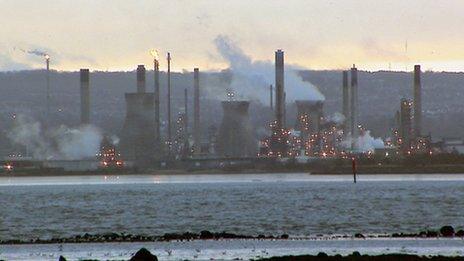Ineos says Grangemouth revamp 'on schedule'
- Published
BBC Scotland is given exclusive access to the Ineos-owned Grangemouth plant 12 months after a bitter industrial site almost closed the plant
The owners of the Grangemouth refinery have said radical changes are on track a year after the site was closed by an industrial dispute.
Ineos is converting the petrochemical site to use shale gas from the US, which it hopes will boost production.
Work at Grangemouth ground to a halt a year ago amid a bitter dispute between Ineos and members of the Unite union.
Unite said changes to pay and conditions since then had caused some workers to leave.
The dispute first flared up in the summer of last year over the company's treatment of Unite official Stephen Dean.
Operator Ineos later announced that the petrochemical plant was to shut, with the loss of 800 jobs, after union members rejected a survival plan.
Ethane terminal
But the decision was reversed after the union agreed to Ineos's conditions, which included a three-year pay freeze and changes to pensions.
Since then, Ineos has announced it would invest more than £400m in a project to bring cheap shale gas ethane from the US to Grangemouth.
Hundreds of miles of pipes have been constructed in the US, eight new ships are being commissioned in China and work has started at Grangemouth on building Europe's biggest ethane terminal.
Controversially, Ineos has also bought two licences for shale gas exploration and development in central Scotland.
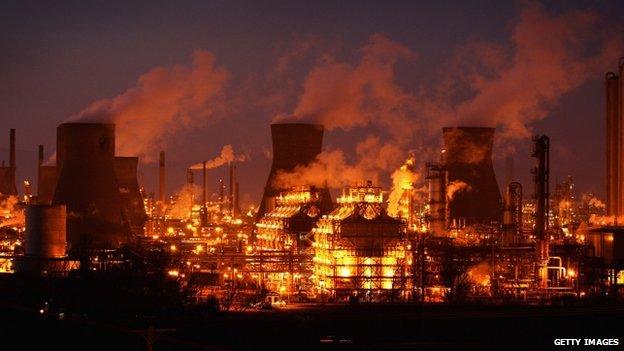
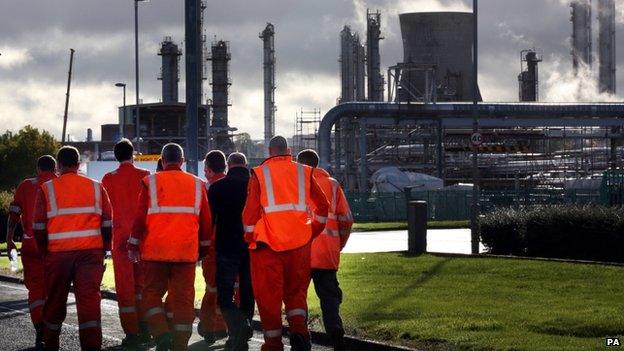
John McNally, managing director of Ineos, said Grangemouth was now moving into the premier league of petrochemical plants.
He added: "It is one of the most exciting moments in the site's history. In 2016, we will be the first company in the UK to use US shale gas ethane and we will go from loss making to profit making overnight with all that means for jobs and investment in Scotland."
The Grangemouth plant is said to be one of the very few that can use shale gas as both a raw material and an energy source.
Ineos has said the plant was continuing to lose money, but would become profit-making as soon as the first US shale gas was processed.
That would mean long term jobs and more investment at Grangemouth, the company said.
Grangemouth is already said to be responsible for about 10% of Scotland's gross domestic product (GDP) and up to 85% of its fuel supply, with Northern Ireland and the north of England also dependent.
'Game changer'
Mr McNally added: "This project will not just be transformational for Grangemouth but potentially for the whole of Scottish manufacturing.
"It's a game changer and both the company and the workforce are proud of what they have achieved in just twelve months".
Unite's Scottish secretary, Pat Rafferty, said that significant public and private investment looked to have secured Grangemouth's future as a major national asset.
But he said there had been a "significant flight of workers" from Grangemouth to industry competitors as a direct consequence of the company's survival plan and the global demand for experienced petro-chemical and refining skills.
Mr Rafferty added: "While the company's loss has most certainly been the industry's gain, Unite has justifiable concerns moving forward over the impact of this labour flight in terms of sufficient levels of manpower, experience and skills for such a production and safety intensive site.
"Prior to the events of October 2013, the company consistently recognised the value of the trade union role in helping to deliver sustainability and expertise to important functions such as quality control and workplace safety.
"While we won't deny our engagements with the company over the last twelve months have not been without difficulty, the simple fact of the matter remains that the company's employees require recognised infrastructures on-site that help to deliver a safe and sustainable future for the workforce, the company and indeed the country.
"That in itself is an objective and rational case for consultation with and the participations of the trade union at Grangemouth both now and in the future."
- Published26 October 2013
- Published25 October 2013
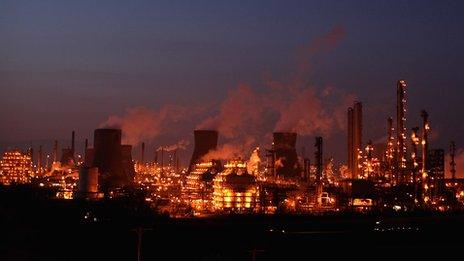
- Published25 October 2013
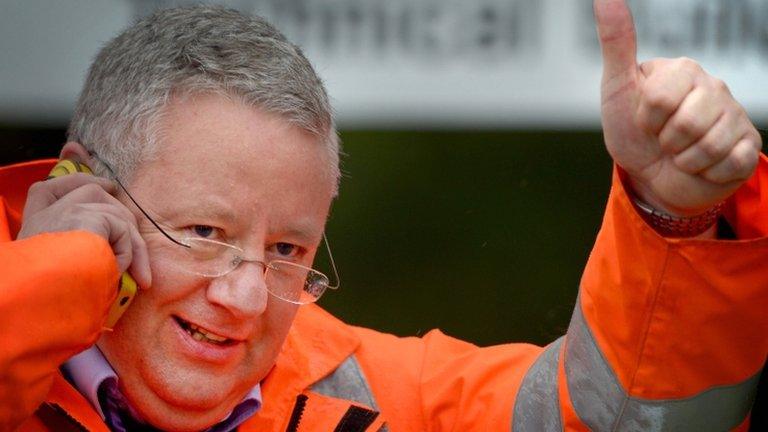
- Published17 October 2013
